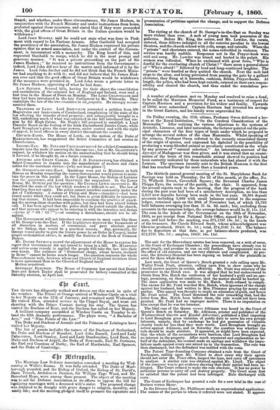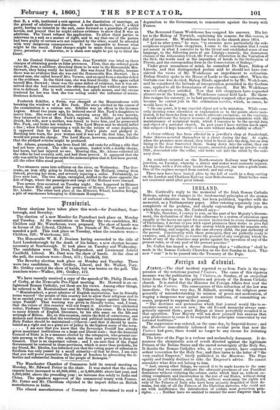f4r 3littrupp1iz.
The Marriage Law Defence Association convoked a meeting for Wed- nesday at Willis's Rooms. It was fully attended. The Duke of Marl- borough presided, and the Bishop of Oxford, the Bishop of St. David's, Dean Trench, Archdeacon Denison, Sir William Page Wood, and Mr. Beresford Hope, were among those present. The object of the meeting was to aid the Defence Association in its efforts to oppose the bill for legalizing marriages with a deceased wife's sister. The proposed change was declared to be fraught with grave danger to religion, morality, and amily life ; and the meeting pledged itself to promote the signature and
presentation of petitions against the change, and to support the Defence Association.
The rioting at the church of St. George's-in-the-East on Sunday was more violent than ever. A mob of young men took possession of the galleries. Before Mr. King, the rector, and Mr. Lowder, the curate, entered, these fellows indulged in all the outcries peculiar to the lowest theatres, and the church echoed with yells, songs, and catcalls. When the "priests" and choristers entered, the noises redoubled in violence. The service was hardly audible. Responses not in the Prayer-book were said and sung. Mr. Lowder was hissed and hooted in the pulpit. His sermon was ridiculed. When he exclaimed with great force, "Who is fearful for the everlasting church of Christ ? " there arose a general shout of "Who's afraid?" followed by loud and long-continued laughter. The "priests" were hustled as they quitted the church. Next the mob laid siege to the altar, and being prevented from passing the gate by a gallant chorister, they flung at it hassocks, cushions, Bibles, Prayer-books. At length, the police, who had been kept outside, entered on their own respon- sibility and cleared the church, and thus ended the scandalous pro- ceedings.
A number of gentlemen met on Monday and resolved to raise a fund, to be called the Harrison Memorial Fund, as a testimony of respect for Captain Harrison and a provision for his widow and family. Upwards of 10001. were subscribed. Captain Harrison had invested his savings in the Great Eastern, and his family were unprovided for.
On Friday evening, the 27th ultimo, Professor Owen delivered a lec- ture at the Royal Institution, "On the Cerebral Classification of the Mammalia." After noticing the various objections to the systems of Aristotle, Linnieus, and later naturalists, the lecturer pointed out the prin- cipal characters of the four types of brain under which he proposed to arrange the several orders of the class Mammalia. Whilst speaking of the cetacea, Professor Owen referred to the recently enunciated theory of the origin of species and expressed his disbelief in the possibility of producing a warm-blooded animal so peculiarly- constituted as the whale by any process of "natural selection.' An interesting account of the Aye-aye of Madagascar was then given, and it was stated that an exami- nation of the brain of this remarkable animal showed its position had been correctly indicated by those naturalists who had placed it with the Lemurs. The specimen recently sent to the British Museum is the first that has reached Europe for more than a hundred years.
The thirtieth annual general meeting of the St. Marylebone Bank for Savings was held on Thursday, the 2d of this month, at the office, No. 76, Welbeck Street, Cavendish Square; the Reverend Charles James Phipps Eyre, the rector of the parish, in the chair. It appeared, from the several reports read to the meeting, that the progress of the bank during the past year had been of a satisfactory description, no less than 2,625 new deposits having been made in the last year. 30,391 deposit accounts including 9,009 with small balances carried to the suspense ledger, remained open on the 20th of November last, of which 24,703 held balances averaging less than 21. 5s. 8d. eaeh ; but, excluding those accounts in the suspense ledger, the average balance would be W. 118. 11d. The sum in the hands of the Government on the 20th of November, 1869, as per receipt from National Debt Office, signed by Sir A. Spear- man, and laid before the meeting, was 372,170/. 188. 6d.; in the hands of the treasurer, Sir Claude Edward Scott, whose acknowledgment was likewise produced, 20451. 98. 1d.; total, 374,216/. 78. 6d. The balance due to depositors at that date, as per balance-sheets produced, was 372,2721. 108. 7d.; surplus, 1943/. 16e. 11d.
The suit for the Shrewsbury estates has been removed, on a writ of error, in the Court of Exchequer Chamber ; the proceedings have already run to great length, and promise to run on still further. The arguments turn on the effect of old statutes, and are very abstruse and complicated. At pre- sent, the Attorney-General has been arguing on behalf of the plaintiffs in error for three whole days.
Last week, the Court of Queen's Bench granted a rule calling upon Mr. Walter Freak Pratt, attorney, calling upon him to show cause why he should answer matters in certain affidavits. Mr. Pratt was attorney of the prosecutor in the Hatch case. It was alleged that he had endeavoured to obtain from Mrs. Hatch the confession of her husband's guilt and an apo- logy, promising., on these conditions, that the matter should be hushed up. The same application was 'made to Mr. Hatch. Both refused to comply. The excuse for Mr. Pratt was that Mrs. Hatch, when ignorant of the charge against her husband, had written to Mrs. Plummer praying for mercy and pardon. This appeal was thought to imply an admission of guilt, and hence Mr. Pratt acted. The Court•dismissed the rule remarking that, had the letter from Mrs. Hatch been before them, the rule would not have been granted. Mr. Pratt had no improper motive. There is no imputation on him except that he was too humane.
The libel case of ;the Queen versus Atkinson was heard in the Court of Queen's Bench on Saturday. Mr. Atkinson, printer and publisher of the Westmoreland Gazette and .Kendal Advertiser, published a libel imputing to Lord Brougham gross violation of public duty to serve his own private interests, namely, that by exchange he had got possession of valuable charity lands for less than they were worth. Lord Brougham brought an action against Atkinson, and on Saturday the question was whether the rule should be made absolute. It appeared, as might have been expected, that the whole of the accusations were baseless, that Lord Brougham had no interest in the property. After much argument and explanation on be- half of the defendant, his counsel made an apology and withdrew the impu- tations made against every one mixed up in the transaction. The rule was then discharged, but the defendant was saddled with the costs.
The Patent Type-founding Company obtained a rule from the Court of Exchequer, calling upon Mr. Walter to show cause why their agents should not enter the Times office, inspect the type, 'and carry off specimens to analyze. A similar, rule was obtained against Mr. Lloyd. The object of the company was to get evidence showing that their patent had been in- fringed. The 'Court refused to make the rule absolute. It has no power to authorize persons to carry off and destroy property. The Court must first be satisfied that the patent had been infringed. Rule discharged with coats.
The Court of Exchequer has granted a rule for a new trial in the case of Beatson versus Skene.
In the Divorce Court, Dr. Phillimore made an unprecedented application. The names of the parties to whom it referred were not stated. It appears that B, Et wife, instituted a suit against A for dissolution of marriage, on the ground of adultery and desertion. A made no defence; but C, a third party, having no interest in the suit, came forward as a guardian of public morals, and prayed that he might adduce evidence to show that B was an adultress. The Court refused the application. To allow third parties to intervene in a suit as a matter of right, and to say that one of the parties bad been guilty of certain acts not imputed by the other, would be attended with very dangerous consequences. It was impossible to foresee what might be the result. False charges might be made from interested mo- tives, pecuniary or otherwise, or a sham case might be got up to blind the Court.
At the Central Criminal Court, Mrs. Jane Tyrwhitt was tried on three charges of obtaining goods on false pretences. First, that she ordered goods value 61., from a milliner, directing them to be sent to the Honourable Mrs. Stewart, they being really for herself. She was found Not Guilty, because there was no evidence that she was not the Honourable Mrs. Stewart. In a second case, she called herself Mrs. Vernon, and escaped from a similar defect in the evidence. In the third case, she was found Guilty. She again called herself Mrs. Stewart ; there was the same defect of evidence, but it was ad- mitted that she bad committed the offences charged but without any inten- tion to defraud. She is well connected, has ample means, and the excuse tendered for her was that she was acting under the influence of mania. Sentence deferred.
Frederick Schiller, a Swiss, was charged at the Mansionhouse with breaking the windows of a Mrs. Pack. Ihe story elicited in the course of the examination is a curious one. Schiller was an officer in the German Legion. About two years ago, he induced one of Mrs. Pack's daughters to marry him. She went off with him, carrying away 50/. In two months, they returned to live at Mrs. Pack's expense. As Schiller got habitually drunk, his wife, now a mother, was forced to leave him, and he persecuted Mrs. Pack, and broke her windows. The Lord Mayor said he should inflict a fine ; when Schiller expressing a wish for the return of some duplicates, it appeared that he had taken Mrs. Pack's plate and pledged it. Bursting into tears, the poor woman said it was not the first time but she would not press the charge. The Lord Mayor, however, remanded Schiller that the pledged articles might be produced.
Mr. Adams, ganmaker, has been fined 101. and costs for selling a rifle that had not been proved. The rifle in question, loaded with a double charge, had burst, but had injured no one. -Hearing this, Mr. Adams collected all the rifles he had recently sold, and had them proved. It appeared that the rifle was sold by his foreman under the misconception that it had been proved. All the other rifles stood proof.
Two steamers came into collision on the river, on Wednesday. The Ger- _trude, an iron ship going to Ireland", ran- bite the Holland, coming-froni Ostend, piercing her stem' and severely injuring a sailor. Fortunately, no lives were lost. The two ships, entangled, drifted to the shore opposite the Isle of Dogs, where the passengers and cargo of the Holland were rescued.
Two severe fires occurred on Tuesday night. One happened in Skinner Street, Snow Hill, and gutted the premises of Messrs. Fraser and Co. and Mr. Loader. The other took place at the Hibernia Wharf, London Bridge, a pile of warehouses belonging to Aldermau Humphrey.



























 Previous page
Previous page